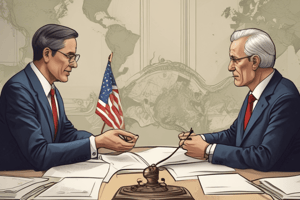Podcast
Questions and Answers
What is the primary function of a foreign ministry?
What is the primary function of a foreign ministry?
- To establish military alliances
- To concentrate and manage foreign affairs (correct)
- To engage solely in cultural exchanges
- To oversee domestic policies of the state
In which century did the concentration of foreign affairs into a single ministry begin to emerge in Europe?
In which century did the concentration of foreign affairs into a single ministry begin to emerge in Europe?
- Twelfth century
- Seventeenth century
- Fifteenth century
- Sixteenth century (correct)
How were foreign affairs typically managed by individual European states until the sixteenth century?
How were foreign affairs typically managed by individual European states until the sixteenth century?
- By various local offices with overlapping responsibilities (correct)
- Exclusively managed by military leaders
- Through a single centralized office
- Only by the monarch without bureaucratic support
What prompted the establishment of foreign ministries in Europe?
What prompted the establishment of foreign ministries in Europe?
What consequence arose from the increasing number of resident embassies in Europe during the seventeenth and eighteenth centuries?
What consequence arose from the increasing number of resident embassies in Europe during the seventeenth and eighteenth centuries?
What is a fundamental aspect of successful negotiations according to diplomatic practices?
What is a fundamental aspect of successful negotiations according to diplomatic practices?
Which type of embassy is characterized by high security measures and limited accessibility?
Which type of embassy is characterized by high security measures and limited accessibility?
In the context of diplomatic negotiations, which of the following is crucial for maintaining clarity and understanding?
In the context of diplomatic negotiations, which of the following is crucial for maintaining clarity and understanding?
Which of the following roles is associated with the activities of embassies?
Which of the following roles is associated with the activities of embassies?
What is a significant motive for the use of mediation in international relations?
What is a significant motive for the use of mediation in international relations?
Flashcards are hidden until you start studying
Study Notes
The Foreign Ministry
- Most states possess a ministry of foreign affairs to manage diplomatic services.
- The establishment of foreign ministries is a relatively recent development in European history, emerging after resident diplomatic missions by almost three centuries.
- Prior to the sixteenth century, responsibility for foreign affairs was scattered among various bureaucracies without centralized administration.
- The growth of international relationships and the establishment of resident embassies in the seventeenth and eighteenth centuries initiated the formation of dedicated foreign ministries.
Historical Development
- The Continental Congress formed a Department of Foreign Affairs on January 10, 1781, marking the beginning of a more organized foreign relations framework in the United States.
- The U.S. foreign ministry evolved from the Department of Foreign Affairs to the Department of State in July 1789, reflecting a shift in responsibilities that included some domestic duties.
- By the nineteenth century, foreign ministries had begun to grow larger and more bureaucratically sophisticated, forming specialized administrative units based on function or geographical regions.
Structure and Function
- A typical foreign ministry includes a foreign minister as the political head and a permanent senior official overseeing administration and policy influence.
- Entry into the foreign ministry increasingly requires appropriate educational qualifications, although recruitment historically favored the upper social class.
- Foreign ministries contended with other entities, such as monarchs, presidents, and war offices, for authority in shaping and executing foreign policy during the nineteenth century.### Functional Departments and Specialist Knowledge
- Functional departments lack in-depth knowledge of global languages and histories, impacting policy quality.
- The internal FCO report highlighted ignorance as a key factor in the failure of British policy in Iran before the Shah's fall in 1979.
Reforms in Foreign Ministries
- Late 1970s: French foreign ministry reformed to restore geographical administrative divisions, reversing two decades of functional advancements.
- In the FCDO, geographical departments still compete with functional departments for relevance.
- The US State Department's six regional bureaus are central to operations, despite complex structural organization.
Prominence of Geographical Departments
- Smaller states like Armenia and Botswana exemplify foreign ministries with significant geographical department representation.
- Multilateral departments have emerged in most foreign ministries, often addressing regional bodies like the African Union.
Intelligence and Research Departments
- Some ministries feature ‘intelligence and research’ divisions that analyze information obtained from secret agencies.
- Foreign ministries primarily consume intelligence products but also participate in high-level assessments through inter-departmental committees.
Importance of Institutional Memory
- A well-maintained institutional memory is vital for effective policy making and implementation.
- Archives historically housed promises, treaties, maps, and internal documents, essential for understanding foreign policy history.
Fluctuating Influence of Foreign Ministries
- A foreign ministry's influence can vary based on the alignment of officials' biases with political leadership.
- The Department of State faced decreased influence during the Nixon era due to a political tilt toward Pakistan against the pro-Indian leanings within the department.
Impact of Political Changes
- The State Department's position deteriorated post-2017 under President Trump, marked by inexperienced leadership and significant budget cuts.
- Demoralized staff and a talent exodus characterized the State Department during this period.
Effects of Brexit on the FCO
- The FCO opposed Brexit, predicting its detrimental impact on British diplomacy and European harmony.
- Creation of the Department for Exiting the European Union in July 2016 separated Brexit negotiation responsibilities from the FCO, alongside new economic diplomacy tasks passed to a different department.
Influence of Foreign Ministers
- The influence of foreign ministries can fluctuate with the experience level of foreign ministers.
- Less experienced ministers can be educated by senior officials, which historically led to shifts towards more assertive foreign policy, as seen with French foreign ministers in 1911.
Studying That Suits You
Use AI to generate personalized quizzes and flashcards to suit your learning preferences.




